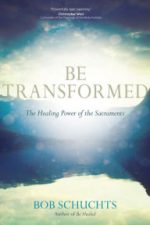 “Be Transformed: The Healing Power of the Sacraments”
“Be Transformed: The Healing Power of the Sacraments”
by Bob Schuchts.
Ave Maria Press (Notre Dame, Indiana, 2017).
166 pp., $16.95.
Bob Schuchts is a retired marriage and family therapist and founder of the John Paul II Healing Center in Tallahassee, Florida. It is his conviction — outlined in “Be Transformed” — that for Catholics one of the fundamental purposes of each of the seven sacraments is to be a source of healing in a particular way.
Thus, baptism is a source of healing from rejection. Confirmation heals from powerlessness. Holy orders provides healing from confusion, and matrimony heals fear. The sacrament of reconciliation can heal us from shame, and the anointing of the sick heals from hopelessness. Also, Schuchts says, Communion (more on this terminology anon) “heals wounds of abandonment.”
Following chapters on “How We Reflect God’s Glory” and “How the Sacraments Restore Us to Wholeness,” each sacrament gets a thought-provoking, if theologically unconventional, chapter of its own, including questions for discussion and further material for reflection.
[hotblock]
For example, Schuchts begins his chapter on baptism with a look at the unhappy early life of Margaret Sanger, founder of Planned Parenthood. He then launches his discussion of baptism by first describing it as “a public blessing declaring that you and I are precious and unrepeatable gifts of the Father.”
This may be a valid way to begin a psychological discussion of baptism as a cure for rejection, but it’s less likely to be the most theologically balanced way to lay a foundation for such a discussion.
Another example: The reader may be perplexed to find that Schuchts refers to the sacrament of the Eucharist as “holy Communion.” For Communion is but one part, albeit the central part, of the Liturgy of the Eucharist, the other part of the Mass being the Liturgy of the Word.
What the church calls the sacrament of the Eucharist is the Mass entire, not only Communion, and Communion is no sacrament unto itself, apart from the rest of the Mass. Thus, it would far more theologically accurate to discuss the Eucharist/Mass, not just “holy Communion,” as healing “wounds of abandonment.” How does the Liturgy of the Word contribute to healing from “wounds of abandonment”? One may doubt that Schuchts’ approach here is helpful to encouraging in Catholics a balanced understanding of the Mass.
In his concluding chapter, Schuchts summarizes what he has written about each sacrament as a source of healing. He adds scriptural reflections and provides a helpful concluding prayer for each sacrament. The reader will find in “Be Transformed” discussions of the sacraments that will lead to paths of healing and insights unlikely to be discovered elsewhere.
***
Finley is the author of more than 30 books on Catholic themes, including “The Gospel Truth: Living for Real in an Unreal World” (Wipf & Stock) and “The Rosary Handbook: A Guide for Newcomers, Old-Timers, and Those In Between” (Word Among Us Press).
PREVIOUS: ‘It Comes at Night’ sends virtue scuttling by dawn
NEXT: Author confronts secular challenges but raises questions for Catholics


Share this story